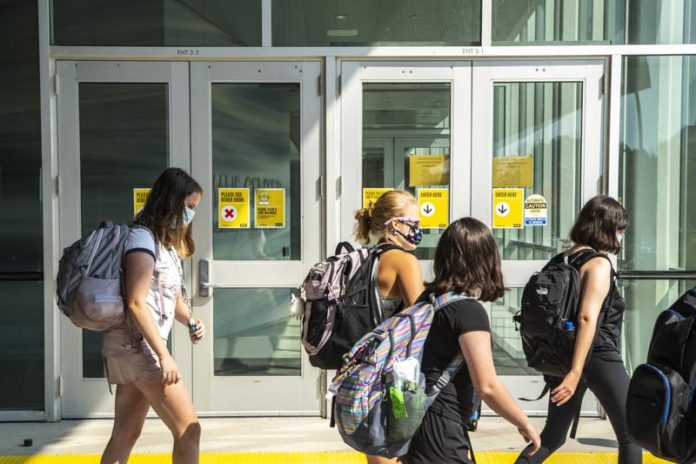
The Arizona Supreme Court on Wednesday declined to immediately reinstate a series of new laws that include measures which block schools from requiring masks and restrict the power of local governments to impose COVID-19 restrictions.
The high court turned down Republican Attorney General Mark Brnovich’s request that the provisions in three state budget bills and an entire budget bill be allowed to take effect. Instead, the court set a briefing schedule for it to consider Brnovich’s request to bypass the Court of Appeals and hear the case directly.
Maricopa County Superior Court Judge Katherine Cooper issued a ruling Monday blocking the school mask ban and a host of other provisions in the state budget package from taking effect as scheduled on Wednesday.
She sided with education groups that had argued that the bills were packed with policy items unrelated to the budget and violated the state constitution’s requirement that subjects be related and expressed in the title of bills.
Cooper’s ruling cleared the way for Arizona cities and counties to enact mask requirements and other COVID-19 rules that would have been blocked by the budget bills. At least 29 of the state’s public school districts issued mask mandates before the laws were set to take effect, and some immediately extended them after Cooper’s ruling.
Republican opponents of school mask requirements and local COVID-19 restrictions are powerless to immediately pass new versions of the laws even if GOP Gov. Doug Ducey calls a special legislative session. That’s because there are two GOP vacancies in the closely split House, and Republicans no longer have the votes to pass bills without Democratic support.
Cooper’s sweeping ruling also struck non-virus provisions that were slipped into the state budget and an entire budget measure that had served as a vehicle for a conservative policy wish list. They included a required investigation of social media companies and stripping the Democratic secretary of state of her duty to defend election laws.
Brnovich urged the court to strike down Cooper’s ruling, saying the groups that sued had no legal right to challenge the bills, that the issue was political and outside the courts’ jurisdiction, and that Cooper wrongfully concluded they violated the constitution.
“The trial court’s ruling carries significant implications for the operation of state government, and the State will continue to suffer harm if the trial court’s ruling is not swiftly overturned, allowing the challenged provisions to immediately go into effect,” attorney Patrick Irvine wrote in his request for the Supreme Court to directly take the appeal.
Cooper had rejected similar arguments.
Brnovich also asked Cooper and the state Court of Appeals to allows the laws to go into effect, but both rejected the requests on Wednesday.
The fight over school masks and other COVID-19 restrictions has moved into courtrooms across the U.S. Lawsuits have been filed in at least 14 states either for or against masks in schools. They directly challenge either state rules banning masks or local school board policies mandating them.
In Arizona, a coalition of educators and allies sued to challenge laws prohibiting public school districts from imposing mask requirements, colleges from requiring vaccinations for students, and communities from establishing vaccine passports for entry into large events, businesses, and other places. It also challenged a broad invalidation of any other local virus measure.
The coalition argued a large number of Arizona children would get sick with COVID-19 if the new laws weren’t blocked. The restrictions had been written into state budget measures passed near the end of the legislative session in June with only support from majority Republicans.
A spokesman for Republican Gov. Doug Ducey, C.J. Karamargin, on Monday called Cooper’s ruling “clearly an example of judicial overreach.”
Cooper’s decision has far-reaching ramifications for the Legislature, which has long ignored the constitutional requirement that budget bills only deal with spending items. Lawmakers have packed with them policy items, and this year the majority of Republicans were especially aggressive.
Republished with the permission of the Associated Press.














